The Hottest August is 90% of a great film with a bad 10% that almost drags it down entirely. Because of this, it provides a nice case study in what happens when filmmakers get in their own way. Director Brett Story has an immense talent for capturing small moments, but her attempts to fit her sporadic, meandering slices of life into a bigger frame end up lessening the impact of the footage she’s collected. Sometimes, less is more.
As the title suggests, the footage in the film comes exclusively from one month – August 2017 in New York City. This restriction alone makes the film remarkable, because Story and her crew capture a rich cross section of one of the most diverse cities in the world. Young and old, black and white, immigrant and native: The Hottest August gives them all screen time, and takes them all seriously. The film’s best interview is probably its first, where a half-naked man leans out of the window of a beach house and talks to Story, eventually bringing a friend over to say hello. They are both union men, blue collar workers, and the conversation takes a turn when immigration comes up. At this point you think you know where they’re going, but Story stays with them as they reason their way toward blaming, not the immigrants themselves, but the employers who exploit them. It’s a testament to the power of patience and sympathy when filming subjects.
Story shows the same instincts in every interaction she films, from skateboarding teenagers in a park (one of whom wants to refute the stoner stereotype projected by the others), to a man preparing a telescope to catch the solar eclipse, to a proponent of “robot communism.” The film has a laid-back vibe in these moments, floating from interview to interview with little internal logic, at least on the surface. This sort of loose filmmaking won’t appeal to everyone, but I found its associational rhythms pleasing and affecting.
The Hottest August does have an underlying motive and structure, however, and it is this that gets the film in trouble. Story wants to say something about climate change, and more broadly about the way that our vision of the future might be narrowing through fear of impending cataclysm. That’s a fine theme for a film, and in subtler moments it comes across nicely, such as when Story asks subjects what they think the future will be like, and receives answers ranging from the personal to the cynical to the catastrophic.
But the film also features a more direct incorporation of this theme, in the form of a tendentious, boring voice over narrative that I suppose some would consider “poetic,” but felt to me like the sort of writing done by MFA students who are trying too hard. Surprisingly, some of the words spoken come from Annie Dillard, Zadie Smith, and Karl Marx, at least two of whom are talented writers. Shorn of context, however, and spoken in ominous tones, these passages feel forced and more than a little silly. It’s a shame, because there’s so much good in The Hottest August. Get me a recut version minus the voiceover, and I’d be all in.

